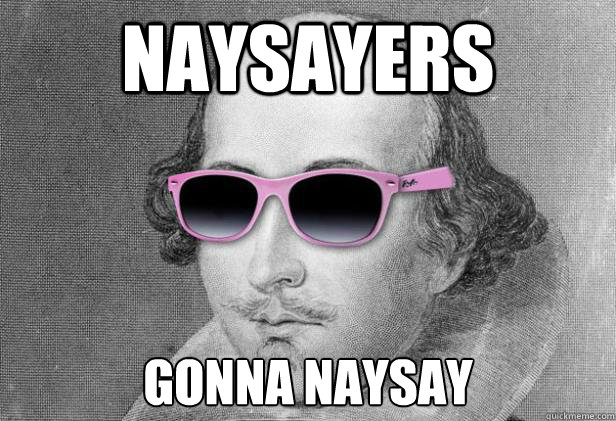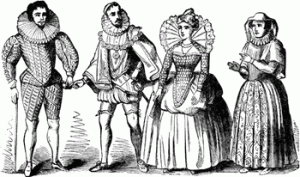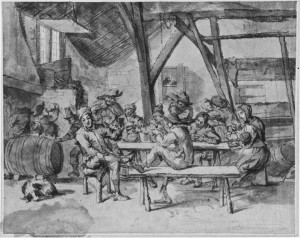The tavern scenes in Henry IV Part I are set in stark contrast to those that take place in the room’s of royalty and the battlefield. Hal’s lower class friends are not so concerned with the overthrowing of monarchs or war strategy. Pranks and hearty eating are much higher on the list of priorities at the tavern in Eastcheap. Why would Shakespeare include such debauchery in one of his histories praising the rise of the current royal bloodline? Harry’s time in the taverns is important in creating a more dynamic, more relatable depiction of England. It also creates a space removed from the drama of the royals and war where Harry and can temporarily escape to. Just as importantly, when Harry leaves the tavern, the heavy reality and role into which he was born can be fully appreciated. Continue reading
Category Archives: Scholarly Criticism

Francis Bacon and Rodrigo Lopez: Localizing xenophobia and homophobia in Elizabethan Micropolitics
If we probe into what Jim O’Rourke over at Florida State University calls the late 16th century “micro-politics” of Tudor England, we arrive at the interplay of Elizabethan prejudice, humor and self-hatred. O’Rourke is engaged in a debate with other scholars and his goal is to re-frame The Merchant of Venice as an anti-racist work that was written in response to the high profile case of Francis Bacon and Rodrigo Lopez in 1594, but his efforts are most helpful in localizing the themes of xenophobia and homophobia in the immediate historical moment of the play. Continue reading
Shylock as a Hero of Faith
A father who wishes his own daughter dead for spending running off and spending his money? Doesn’t sound like the type of guy who’s winning any father of the year awards. Continue reading

The Power of Reimagining: “Merchant” in Theresienstadt (Terezin)
Re-imagining Shakespeare is not a new concept. Just recently, the Dartmouth College Department of Theater reimagined Romeo and Juliet as a more experimental production, setting it in a rehearsal studio and using video cameras to record the action, so that the audience watches the actors both on stage and on monitors and a large video screen. Peter Hackett, the director of the winter main stage, wanted to highlight the less-obvious more salient aspects that are not as often explored in a traditional Shakespearean manner. Challenging the conventional view, Hackett wanted the audience to ponder and be critical of what was being presented to them on stage. “It forces you as an audience not to sit back and have your expectations met. … I hope the effect is that it makes you listen to what is being said,” Hackett said.
In Mobile Carnival Theatre Company’s reimagining of Shakespeare’s The Merchant of Venice, director Brent Murrill, like Dartmouth theater director Peter Hackett, reimagined Shakespeare’s traditional setting in a more contemporary fixture.
Post Holocaust Interpretation
Post Holocaust Interpretation
The Holocaust permanently changed the perspective from which ‘The Merchant of Venice’ is read. It ended the debate as to whether Shylock is a victim or a villain. Shylock is a victim, and to say otherwise would be wrong, both morally and analytically. Continue reading
Homosexuality and Thrifty Women in The Merchant of Venice
Lars Engle – “Thrift is Blessing”: Exchange and Explanation In The Merchant of Venice
Lars Engle writes a particularly interesting essay called, “Thrift is Blessing”: Exchange and Explanation In The Merchant of Venice, where he exposes a woman who takes advantage of homosexual desires to protect her financial endowment and prove herself as the presiding individual in her marriage. Continue reading
Bassanio’s Sexuality
Bassanio’s sexuality can be examined and scrutinized despite his seemingly heteronormative actions and intentions. The homoerotic undertone of Antonio and Bassanio’s relationship is easily discussed by analyzing the dedication and declarations of love by Antonio because he does not have a heterosexual romantic relationship to counteract against his love for Bassanio. Bassanio’s commitment to Portia, however, does not dictate his sexuality or establish his heterosexuality. Remembering that Bassanio’s relationships take place during a time when homosexuality is a sin and a punishable crime, the audience can translate Bassanio’s actions as the actions of one who is assumed heterosexual by societal default. His attraction to Portia is not being dismissed just because he is not heterosexual. Instead, modern audiences can discuss the idea of bisexuality or a fluid sexuality. Continue reading
“The Problem of More-than-one”
In the article, “The Problem of More-than-one: Friendship, Calculation, and Political Association in the Merchant of Venice” by Henry S. Turner, Turner discusses the political perspective of the play in terms of friendship, calculation and decision, and justice. He discusses the question of the relationship between friendship and democracy, and how “The Merchant of Venice” may show slight traces of modern democracy throughout the play. One point that I found particularly interesting is the idea of the quantum of friendship and how that relates to value in terms of numbers and the blurred lines from which that value comes about. This lack of clarity can be seen in the play in the recurring issues of self-interest versus love and friendship. Continue reading
The Marxist of Venice
Fan Shen’s article ”Shakespeare in China: The Merchant of Venice” examines Chinese social and political climate through an interesting lens: the performances and criticisms of Shakespeare’s Merchant of Venice in China. Shen chooses this play because of its immense popularity in China, as well as the interesting way in which Chinese Marxism has influenced criticisms of the work. Continue reading
Marriage and Mourning
 The themes of marriage and same-sex relationships in Shakespeare’s The Merchant of Venice warrant the discussion of same-sex marriage. While there is no explicit condoning of same-sex marriage, Arthur L. Little argues that the concept of same-sex relationships is used to challenge the very institution of marriage within the play.
The themes of marriage and same-sex relationships in Shakespeare’s The Merchant of Venice warrant the discussion of same-sex marriage. While there is no explicit condoning of same-sex marriage, Arthur L. Little argues that the concept of same-sex relationships is used to challenge the very institution of marriage within the play.

